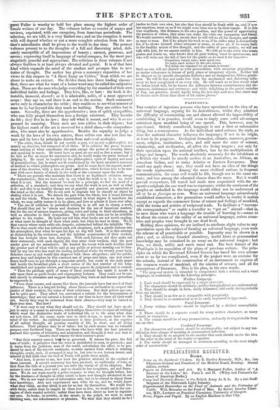PAS SLOG IA.
THE number of ingenious persons who have speculated on the idea of an universal language, arguing for its desirableness, whilst they admitted the difficulty of constructing one and almost allowed the impossibility of establishing it in practice, would seem to imply souse solid advantages attendant upon mankind being of one speech. This, however, may be questioned. Strictly considered, language is not a first or substantive thing, but a consequence. As the individual mind colours the style, so does the national character influence the language; if not in its origin, at least iu its progress. Geological formation, climate, manners, govern- ment, religion, institutions, arts, and still more the state of science, scholarship, and civilization, all afreet the living tongue ; not only by their operation upon the national intellect, but by the multiplication of things and images. The words absolutely necessary for the inhabitant or a British city would be utterly useless to an Australian, an African, an American Indian, and to many Asiatics or Eastern Europeans. They could not apply them ; nay, they could not have an idea of the things the words represented. Among the more civilized nations in frequent communication, the same evil would be felt, though not to the same ex- tent; and less among the educated classes than the mass. But it would prevail everywhere, till travel had made men acquainted with the re- spective originals the one word was to represent; whilst the sentiment of the peoples as embodied in the language would either not be understood at all or be as foreign as ever. Were an universal language miraculously established tomorrow, a few generations would suffice to render it useless except as regards the commoner forms of nature and feelings of mankind, with the terms and articles of reciprocal trade. To facilitate a " mercan- tile correspondence" or enable a traveller to "get on" abroad—that is, to save those who want a language the trouble of learning it—seems to be about the extent of the utility of an universal language, unless coati. tries and peoples were brought to one dead level. Holding these opinions, we are inclined to attribute slight value to any speculation upon the subject of forming an universal language, even were the scheme at all practicable or possible. Ingenuity may be shown in a plan ; and, as alchemy founded chemistry, useful hints or grammatical knowledge may be contained in an essay on the universal tongue : but here, we think, utility and merit must end. The best feature of the Pasilogia is its exposition of the plans of previous writers. The prin- ciples on which the Reverend Edward Groves has based his own scheme seem to us far too complicated, even if the project were an exercise for the schools, instead of the construction of an instrument to express all the common wants of mankind, all the niceties of science, and all the
conceptions of literature. This is his plan, in his own words.
" The proposed system is intended to comprehend both a written and a vocal language, in conformity with the following principles.
Written Language. 1. Each word should be expressed by a single character. 2. The characters should be arbitrary; neither hieroglyphical nor emblematicaL 3. They should be simple in form, easily delineated, and easily distinguishable from one another.
4. They should be as few as is compatible with perspicuity. 5. They should be so constructed as to be easily expressed in type work.
Vocal Language. 1. Every written character should be expressed by a distinct monosyllabic sound.
2. There should be a separate sound for every written character; as many sounds as characters. 3. The sounds should be of easy pronunciation, and easily distinguishable from one another. Combined Language. 1. The characters and sounds should be unchangeable; not subject to any me- dification from change of meaning or grammatical inflection.
2. They should be so adapted to one another that each should excite the idea of the other in the mind of the reader or speaker. 3. The words should be arranged in sentences according to the most simple order of construction."


























 Previous page
Previous page